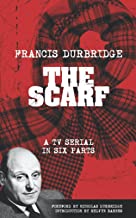I've mentioned Melvyn Barnes on this blog previously, in connection with the good work he's done in relation to Francis Durbridge. He's currently collaborating with an enterprising small press, Williams & Whiting, to bring more of Durbridge's work, a worthy endeavour. I invited Melvyn to tell my readers more about this project:
'My fascination with Durbridge goes back to adolescence (of blessed memory) when I was glued to the radio and later to television in my determination not to miss the next instalment of the latest Durbridge serial. But Durbridge did not figure in the many years that I spent in writing books and articles about crime fiction, until the turning point of retirement from the day job provided more time to spend on research. So perhaps inevitably Durbridge once again took centre stage, particularly as this multi-media craftsman had been largely neglected by the historians of popular culture. And far worse than that, on the Internet he was misrepresented by inaccurate information that will doubtless remain in the ether forever.
Durbridge
thus became my principal subject of research, the result being a self-published
book Francis Durbridge: A Centenary
Appreciation (2015). That was just
the beginning, however, as it had become increasingly clear that Durbridge left
innumerable unanswered questions about his works, the way in which he recycled
plots, things written but never produced, and other aspects that needed to be
investigated and if possible clarified. Indeed
this presented a renewed challenge, requiring another lengthy period of
research that led to the publication of a much larger book Francis Durbridge: The Complete Guide (Williams & Whiting, 2018).
So
was this Case Closed? On the contrary, Francis
Durbridge is never that straightforward and some bombshell revelations soon
began to emerge. These arose from the
fact that although he died in 1998 his widow lived for very many years
afterwards, and understandably their two sons had long deferred sorting their
father’s papers. But now they discovered
that numerous original typescripts had survived, some of them never available
as novelisations or recordings nor even produced in their intended form - be it
radio, television or cinema film. Trumpet
fan-fair - step forward the publisher Williams & Whiting, now contracted to
transcribe and publish all of these typescripts as e-books and print-on-demand
paperbacks.
My
own role has involved validating, proof-reading and in particular writing
Introductions for each book. So far I
have written thirty-four Introductions, with increasing excitement because these
scripts will gradually become an impressive set of uniform volumes. At the time of writing, those already
published or imminent are – The Scarf
(1959 television serial); Paul Temple and
the Curzon Case (1948 radio serial); La
Boutique (1967 radio serial); The
Broken Horseshoe (1952 television serial); Three Plays for Radio Volume 1 (1945-46 Over My Dead Body, Mr Lucas
and The Caspary Affair); Send for Paul Temple (the original 1938
radio serial); A Time of Day (1957 television
serial); Death Comes to the Hibiscus
(c.1942, an unproduced stage play) and The
Essential Heart (1943 radio play), both written under the pseudonym
Nicholas Vane; Send for Paul Temple
(1943 stage play); The Teckman Biography
(1953 television serial); Paul Temple and
Steve (1947 radio serial); and Twenty
Minutes from Rome (c.1954, an unproduced television play).
As
indicated above there are many more to come, and for me it has been a labour of
love. But I gather that Durbridge’s son
Nicholas is now laboriously transcribing his father’s handwritten diaries – so
who knows what new information might emerge?'
Thanks, Melvyn. I'll be posting more about these interesting books in due course.

1 comment:
I am absolutely delighted to hear this, I am such a fan of Durbridge and the Paul Temple stories in particular
Post a Comment